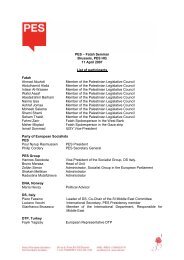Hedge funds and Private Equity - PES
Hedge funds and Private Equity - PES
Hedge funds and Private Equity - PES
You also want an ePaper? Increase the reach of your titles
YUMPU automatically turns print PDFs into web optimized ePapers that Google loves.
92<br />
The following are regarded as serious breaches of the obligations laid down in the Directive:<br />
total absence of information <strong>and</strong>/or consultation of the employees’ representatives prior to a<br />
decision being taken or the public announcement of such decision;<br />
withholding of important information or provision of inaccurate information rendering ineffective<br />
the exercise of the right to information <strong>and</strong> consultation.<br />
In the event of a serious breach with direct <strong>and</strong> immediate consequences in terms of substantial<br />
change or termination of employment contracts or relationships, the decisions taken have no<br />
legal effect. This situation continues until such time as the employer has fulfilled his information<br />
<strong>and</strong> consultation obligations. If this is no longer possible, the employer must establish adequate<br />
redress in accordance with the arrangements <strong>and</strong> procedures in place in the Member States.<br />
Since economic trends are bringing in their wake, at both national <strong>and</strong> Community level, changes<br />
in the structure of undertakings, there is a need to provide for the protection of employees in the<br />
event of a change of employer, <strong>and</strong> in particular to ensure that their rights are safeguarded. To<br />
that end, the Council Directive 77/187/EEC on the approximation of the laws of the Member<br />
States relating to the safeguarding of employees’ rights in the event of transfers of undertakings,<br />
businesses or parts of businesses foresees that the rights <strong>and</strong> obligations arising from a contract<br />
of employment or from an employment relationship existing at the time of the transfer are transferred<br />
to the new employer. Member States are required to adopt the necessary measures to<br />
protect the rights of employees <strong>and</strong> of persons no longer employed in the transferor’s business.<br />
The transfer does not constitute grounds for dismissal, which may only take place for economic,<br />
technical or organisational reasons or when Member States make exceptions in respect of<br />
certain specific categories of employees.<br />
The status <strong>and</strong> function of employees’ representatives are preserved unless, under the provisions<br />
or practice of a Member State, the conditions necessary for re-appointment of employees’<br />
representatives are fulfilled.<br />
The former employer <strong>and</strong> the new employer are required to inform the representatives of their<br />
respective employees in good time of the reasons for the transfer, the legal, economic <strong>and</strong> social<br />
implications, <strong>and</strong> the measures envisaged in relation to the employees. This information must be<br />
given for the employees transferred before their transfer is carried out <strong>and</strong> in any event for all<br />
employees before they are directly affected as regards their conditions of work <strong>and</strong> employment.<br />
When the former employer or the new employer envisages measures in relation to their<br />
employees, they must consult the employees’ representatives in good time with a view to seeking<br />
agreement.<br />
It should be also underlined that referring to Art. 137 i lit. f of the EU treaty, the European<br />
Commission is provided with a power of initiative to create a European provision on obligatory<br />
employee involvement on boardrooms as a European wide st<strong>and</strong>ard.




